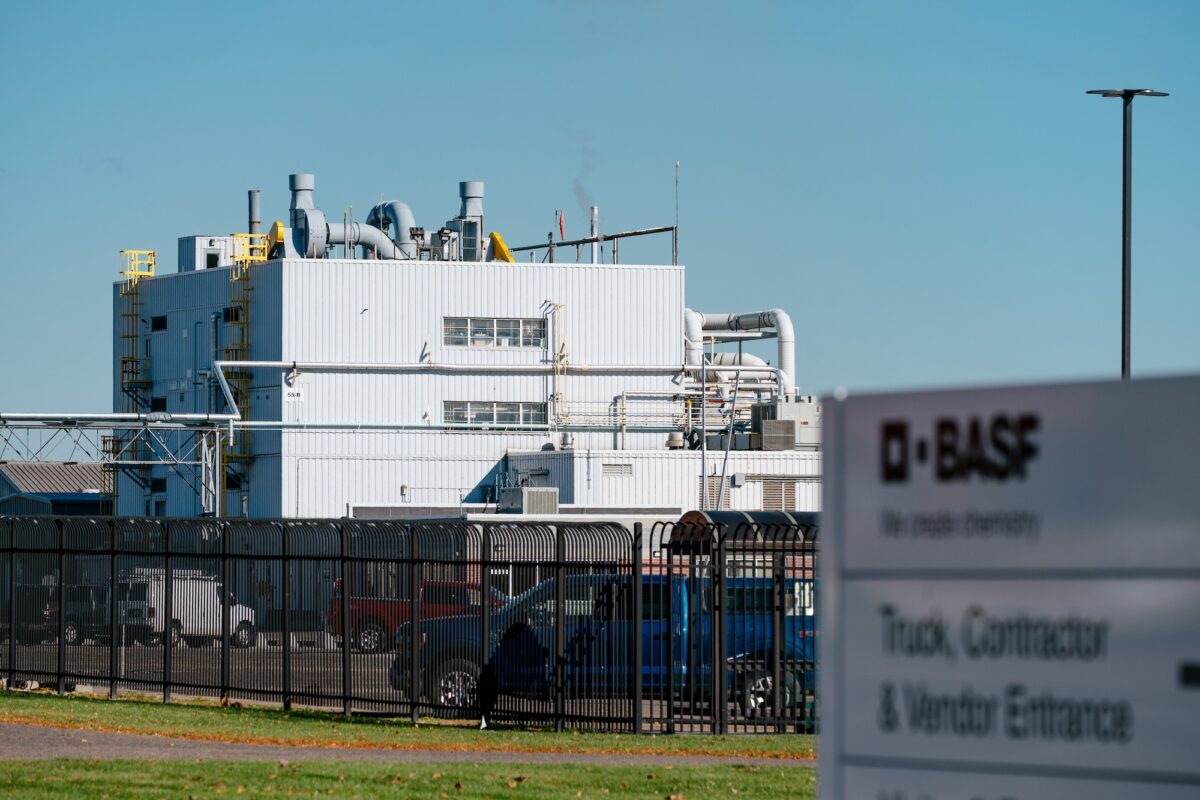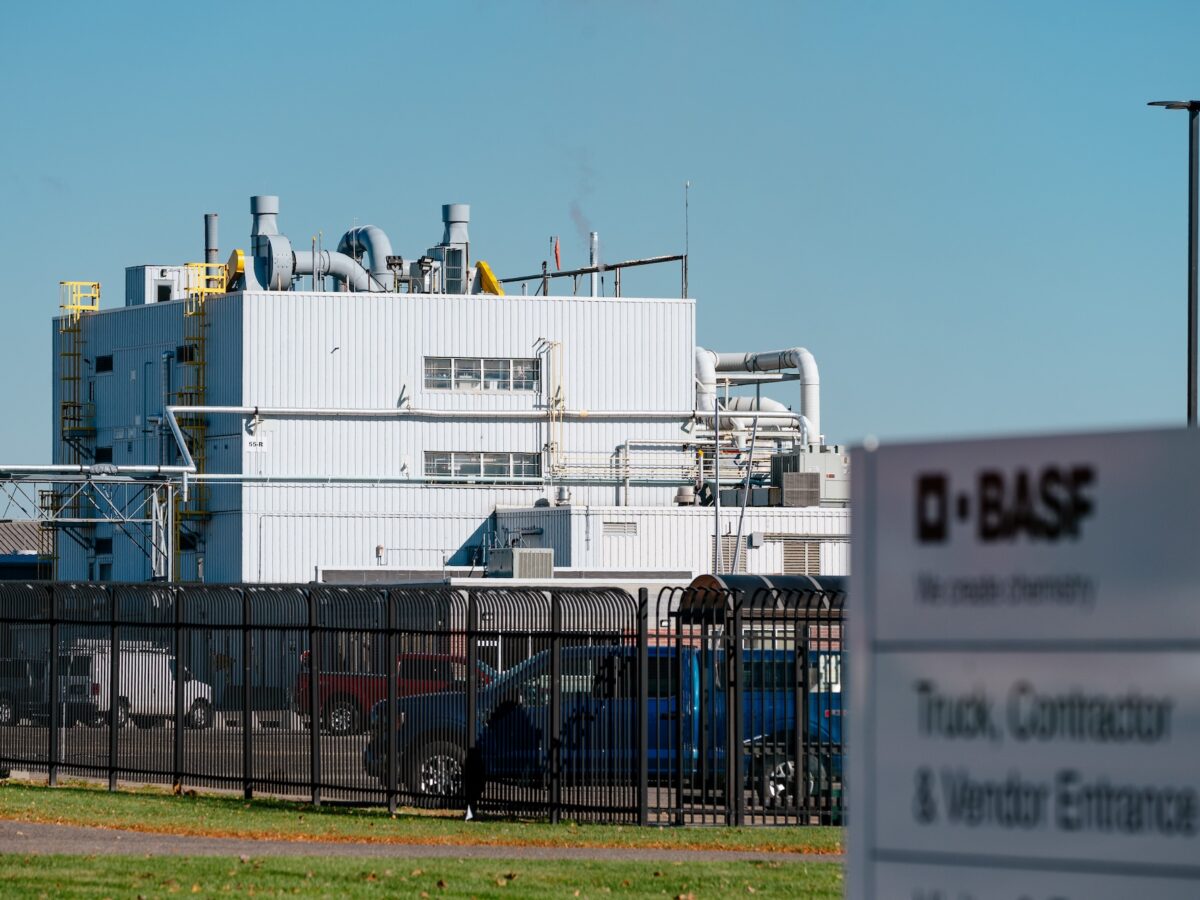Overview:
-BASF's pumping system is intercepting 1.47 gallons of contaminated groundwater per minute, the state says, while up to 60 gallons per minute flow into the Detroit River.
-The site is about 1,700 feet from Wyandotte's drinking water intake.
-Environmental attorney says the amount of contaminated groundwater being removed is "negligible."
Forty-five years after BASF first entered a consent decree with the state of Michigan in which it agreed to stop the flow of contaminated groundwater into the Detroit River, Michigan regulators may require the company to prove it has a plan to curtail the discharges.
In a March 10 letter shared with Planet Detroit, Michigan’s Department of Environment, Great Lakes, and Energy asks the company to provide a plan for managing polluted groundwater, including potential modifications to existing control measures.
The letter states that BASF’s pumping system at its Wyandotte chemical plant is intercepting up to 1.47 gallons of contaminated groundwater per minute. EGLE has previously estimated that up to 60 gallons per minute are flowing into the Detroit River.
This groundwater seeps into the river roughly 1,700 feet from Wyandotte’s municipal drinking water intake and it contains toxic PFAS chemicals, mercury, arsenic, naphthalene, benzene and other chemicals. Some of this water has had a pH as high as 13.22. The Environmental Protection Agency defines substances with a pH of 12.5 or above as hazardous waste.
Brian O’Mara, a geological engineer and environmental remediation consultant, told Planet Detroit in February that BASF could stop the pollution from entering the river in a few months by installing additional wells, trenches, pumps, and packaged water treatment systems to handle specific contaminants in groundwater extracted at the site.
“They have plenty of resources to do this,” he said. “They choose to drag it out and minimize their spending and they are wildly out of compliance.”
BASF did not respond to a request for comment on this story.
BASF failed to stop Detroit River pollution, letter says
O’Mara reviewed BASF’s plans for a physical barrier at the site and said it could still allow contaminated groundwater to flow into the river. Installing more pumps now would create the inward hydraulic gradient needed to keep contaminated groundwater out of the river and could be incorporated into the company’s final remedy for the site, O’Mara said.
EGLE’s letter suggests the agency may require BASF to take more drastic remedial action. It notes that a 1986 consent decree requires “the number of wells and rate of withdrawal from each location be at all times sufficient to halt the flow of contaminated groundwater to the Detroit River and the City of Wyandotte sewer system …”
Groundwater contour mapping from 1996, 2019, 2021, and 2024 shows the remedial system failing to achieve the required inward gradient needed to keep contamination out of the river, according to the regulator’s letter.
EGLE is requiring the company to respond to the letter within 60 days with a description of steps taken to “modify and/or optimize the remedial system to achieve the required hydraulic gradients,” among other measures.
MORE PLANET DETROIT REPORTING ON BASF
Regulators have authority to stop BASF from polluting the Detroit River within months, experts say
Environmental groups oppose using taxpayer money to safeguard Wyandotte’s water without more action from polluter BASF.
BASF report says air monitoring not needed at Grosse Ile toxic waste site. Some experts disagree.
State regulators say the air contamination risk at the BASF toxic waste site in Grosse Isle is low. However, independent experts question why the evaluation excluded some of the most toxic contaminants in the soil, arguing that air testing is needed to confirm if a health threat exists.
EPA says BASF’s ongoing pollution could delay Detroit River cleanup
Michigan looks to get $700 million to clean up contaminated sediment in the Detroit River, but decades of unchecked pollution from BASF’s Wyandotte facility could stand in the way.
Letter may suggest more ‘hardline’ stance on BASF: environmental lawyer
EGLE’s letter shows the level of contaminated groundwater BASF is pumping is “negligible,” said Scott Troia, staff attorney at the Great Lakes Environmental Law Center.
“They’ve been bad actors, just trying to kick this can down the road as long as possible,” he said. “And they’ve saved ridiculous amounts of money doing it.”
He highlighted the roughly $1 billion in funds BASF has set aside for environmental remediation as evidence the company could be doing far more to address pollution at its Wyandotte facilities.
Troia said it’s unclear if EGLE’s letter meant the agency might mandate additional control measures that may be needed to fully stop the flow of pollution into the Detroit River.
“If EGLE wants to take that hardline stance. I think there’s room within (this letter) for them to make that requirement,” he said.
In a statement to Planet Detroit, EGLE spokesperson Josef Greenberg reiterated the letter’s request that BASF modify its operations to meet the requirements of the 1986 consent decree, including achieving “required hydraulic gradients.”
Greenberg didn’t say if EGLE would require BASF to install additional pumps or water treatment units if the current pumping system was unable to keep contamination out of the river.
“Until EGLE evaluates BASF’s response to modify the remedial system required under the Consent Decree, EGLE cannot predict additional effective measures,” he said.





